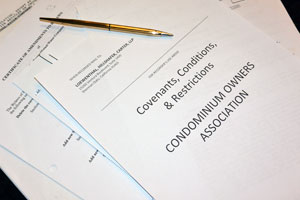LHC Newsletter Vol. 2, No. 1
“CONFIDENTIAL COMMUNICATIONS: What every manager and board member should know about the attorney-client privilege.”
What is the “attorney-client privilege?” Most have obtained their knowledge regarding the privilege from watching TV – that is, discussions between clients and their attorneys are confidential and not to be divulged to third parties absent client consent. While not too far off the mark, such a general explanation fails to address the nuances of the privilege that are directly relevant to the operation and management of homeowner associations. Indeed, as general counsel for hundreds of homeowners associations throughout Southern California, one of the most frequently asked questions we receive from managers and Board members in regard to the privilege is whether executive session discussions and/or minutes are “privileged” against disclosure. The answer to the question is twofold and hinges upon who was present when the Board retreated to executive session and what was discussed.
The first level of analysis is easy. Almost all managers and Board members know that if the Association’s attorney is present during the executive meeting, the discussion and any minutes of the discussion are privileged against disclosure to third parties based on the attorney-client privilege. Such confidentiality arises from the fundamental purpose behind the privilege – that is, to safeguard the confidential relationship between clients and their attorneys so as to
promote full and open discussion of the facts and tactics surrounding individual legal matters.
The second level of analysis is a bit more complicated. What happens if the Association’s attorney is not present for the executive meeting but before the meeting has given the Association’s manager legal advice? Does the attorney’s absence from the meeting mean everything discussed or written down is not privileged and available to third parties upon request? The answer to these questions is not necessarily, depending on what was discussed.
Generally speaking, there is no “executive session” privilege that protects the Association from having to disclose executive session discussions or produce executive session minutes in response to litigation discovery requests. However, a new opinion recently handed down by the Second District Court of Appeal in the decision entitled Zurich American Insurance Company v. Superior Court (Oct. 11, 2007) 66 Cal.Rptr.3d 833, 07 Cal. Daily Op. Serv. 12,141, serves to both answer our earlier question regarding the absence of counsel and provides the Association relief by holding that the attorney-client privilege extends to confidential communications between agents of the client regarding legal advice and strategy, in which the attorney is not directly involved or which do not
include excerpts of direct communications from the attorneys. In other words, even where the attorney is not present for the executive meeting, the executive session discussions and minutes may nevertheless be privileged against disclosure if the attorney provided the manager with legal advice and strategy as the party necessary to transmit the information to the Board of Directors during executive session to further the purpose of the legal consultation. (Zurich, supra, at
839.)
In sum, if documents created during executive session, such as minutes, discuss legal advice from counsel, they are privileged, even if counsel was not present during the meeting. Similarly, if legal advice is discussed or contained in communication between the manager and the Board of Directors, then those too are presumptively privileged. (Zurich, supra, at 844.) And, to preserve the privilege, the manager and the Board of Directors must ensure that the privilege is not inadvertently waived by distributing the legal advice within the Association outside of the Board of Directors.
ASSOCIATION “FACTOIDS”*
- There are more than 280,000 community associations in the United States – in 1965 there were only
500. - An estimated 60 million Americans now live within community associations. More than 1.7 million Americans serve on a community association board, with close to 400,000 participating as committee members.
- The estimated real estate value of all homes in community associations approaches $4 trillion, approximately 20% of the value of all U.S. residential real estate.
- The total annual operating revenue for all community associations in the U.S. is more than $41 billion. Community association boards also maintain investment accounts of more than $35 billion for the long-term maintenance and replacement of commonly held prop- erty.
- 1 in 88 of all foreclosures in the US are in California.
*Sources: Community Association Institute and Mortgage Bankers Association.
© 2007 by Loewenthal, Hillshafer & Carter, LLP. All rights reserved. Permission is granted to reproduce or transmit in any form any part of this newsletter as long as proper attribution to Loewenthal, Hillshafer & Carter, LLP is given. Due to the rapidly changing nature of the law, information contained in this publication may become outdated. As a result, lawyers and all others using this material must research original sources of authority.


